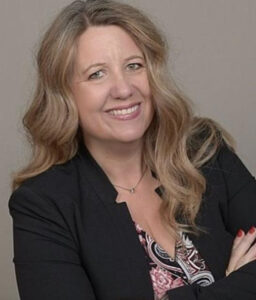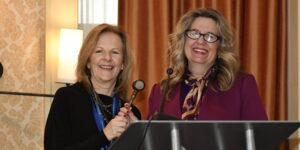As she begins her term as president of the ARP, Kori Dewing, ARNP, DNP, looks forward to helping the ARP and the ACR continue their “amazing work” to support rheumatology professionals, so they, in turn, can provide the finest care to patients.
Dr. Dewing has been an adult nurse practitioner specializing in rheumatology since 2003. She earned her doctor of nursing practice degree in 2009 and currently holds two positions at the University of Washington, Seattle, and is a rheumatology nurse practitioner at the Seattle Arthritis Clinic.
Dedicated to rheumatology practice and patients, Dr. Dewing has been volunteering with the ARP and the ACR for nearly two decades, first as a member of the Clinical Focus Course Task Force, and on many other committees thereafter, including the ARP Practice Committee, the ACR Committee on Rheumatologic Care (CORC), the Committee on Finance, the Annual Meeting Planning Committee, the Abstract Oversight Subcommittee and the ARP Advanced Practice Skills Training Task Force. She has also contributed to the Volunteers to Expand Rheumatology (VERA) initiative and the annual ACR Advocates for Arthritis event.

Dr. Dewing
In discussing her new role as ARP president, Dr. Dewing recalls her journey to this point, how she envisions the ARP and why she is so enthusiastic about the organization and its possibilities moving forward.
The Rheumatologist (TR): What drew you to begin volunteering for the ACR and the ARP?
Dr. Dewing: I still remember the first annual meeting I attended, a year after entering the field of rheumatology. During the business meeting, I was amazed at the breadth of volunteer work and projects described by the presiding ARP president. Later, at the networking event, I was approached by one of the ARP leaders asking if I’d be interested in volunteering. I was a new nurse practitioner (NP) graduate and unsure what I could offer, but I filled out my volunteer application and turned it in that day. A couple of months later, I got a call asking me to be a member of the Clinical Focus Course Task Force, my first volunteer position within the ARP.
TR: You haven’t stopped volunteering, so it must have been a good experience.
Dr. Dewing: It was a great experience for me, working not only with other NPs but also physical therapists (PTs), occupational therapists (OTs), pharmacists and other clinicians as we developed educational programs intended for a wide range of care providers. The experience was deeply rewarding. I felt valued, supported and part of a community. I had found my professional family. That community is what brought me back year after year to volunteer and attend the annual meeting. Those events feel like professional family reunions.
TR: Your volunteer work has had important effects on members. For example, in 2009, the ACR singled out you and Barbara Slusher, MSW, PA-C (who served as the ARP president in 2022), as co-recipients of the ACR President’s Award, recognizing you for your leadership roles in developing the ARP Advanced Practice Skills Training Course. Can you describe that effort and why it was a significant step forward?
Dr. Dewing: After my original volunteer work on the Clinical Focus Course Task Force, I went on to help develop or expand other ARP educational programs. The ARP had identified a need for additional training resources for new NPs and physician assistants (PAs) entering rheumatology, especially on skills like performing joint counts or joint injections. Ms. Slusher and I were asked to create the ARP Advanced Practice Skills Training Course, which accompanied the early version of the Advanced Rheumatology Course—currently being revised. The ARP course helped NPs and PAs develop the skills necessary to practice in the subspecialty of rheumatology, evaluating and managing complex medical conditions with immunologic therapies.
To understand the significance of the task force and the educational programming that followed, I think back to when I first started in this field 20 years ago. At that time, advanced practice providers in rheumatology were quite rare, and our role was limited and often questioned or misunderstood. Now, we’re coveted and valued members of the rheumatology team, thanks in part to the support of ARP and the extensive educational portfolio that has helped us along this journey. I feel privileged to have been part of the early days of NP/PA rheumatology education, to see how much it has developed and to witness the advancement in our field and how far we’ve come in such a short time.
TR: You mentioned that the ARP is involved in a wealth of ongoing projects and initiatives. Which are you particularly enthused about for the coming year?
Dr. Dewing: Over the past year, the ACR leadership has worked hard to develop the 2022–2027 strategic plan, which provides a framework for all our programs and activities for the next five years. With the values of innovation, collaboration, inclusion and community as the focus, I am particularly excited to see this in action.
I feel very fortunate to be coming into this position as president of the ARP right now. The College is actively engaging members of the interprofessional team with its focus on inclusion and diversity, realizing the added value we provide. Those who have served before me have worked hard to foster activities and programs that will support, reconnect and re-invigorate the rheumatology team so we can better serve our patients. This includes strong legislative advocacy, fun and rewarding networking opportunities, professional support and development, innovative educational programming and new and increased funding opportunities for ARP members engaged in research supported by the Foundation. I get the fun job of watching all these new ideas and projects blossom and come to life and, in the background, prepare for the future.
TR: What do you see as some of the biggest obstacles for the ARP in the coming year?
Dr. Dewing: Back in 2015, the ACR’s Rheumatology Workforce Study predicted a significant shortage of rheumatology professionals in the coming years https://pubmed.ncbi.nlm.nih.gov/29400009). No one could have predicted how devastating the pandemic would be for healthcare, and rheumatology, in particular. Our rheumatology workforce was already struggling with the stress associated with heavy workloads, which were further exacerbated by the prolonged pandemic. Understandably, it is hard to sign up for volunteer roles when you go home drained at the end of the day. Yet the ACR/ARP is literally nothing without our volunteers.
TR: How is the ACR/ARP addressing that?
Dr. Dewing: The ACR Workforce Solutions Committee is developing interventions focused on recruiting, training and retaining rheumatology professionals. And with many of us meeting together in Philadelphia for ACR Convergence 2022, I am hopeful our membership will become re-invigorated as we reconnect with friends and colleagues from around the world.
On the volunteer side, for those of us who have already had a chance to attend some type of gathering with our colleagues, we all leave with this warm feeling of, “We can do this. We can get through this.” I urge our membership to become involved. At the beginning of the pandemic, the ACR leadership came together and rapidly addressed the needs of the membership by developing resources like the COVID-19 Global Rheumatology Alliance and the task forces that developed the guidelines on COVID vaccination and treatment for our at-risk patients, helping us to navigate that scary data-free zone. The ACR is truly there for you. We need to nurture this special organization, and volunteering your time, talent and passion is an important way to pay back the support you have been given during these difficult times, while you also reconnect to your rheumatology community.
TR: Since you have been so involved with the ARP, many of the members may feel they already know you well. But what is something they may not know?
Dr. Dewing: While still in high school, I started working in a medical clinic as a certified nursing assistant and then as a certified medical assistant.
After completing my undergraduate program, I joined the Peace Corps and served as a public health volunteer in a small village in Guinea, West Africa. I worked with a variety of people from different backgrounds and occupations, all focused on ways to improve the health of our community. Every Peace Corps volunteer will tell you how much they grew during their service. It’s true. I learned that by working with a diverse group of people, you end up with projects you never could have envisioned or created on your own. I see and appreciate similar diversity in ARP.
TR: Is there anything you would like to add as you embark on your new role as president?
Dr. Dewing: From my years of experience as a nurse practitioner, as a volunteer for the ACR and the ARP, and as a Peace Corps volunteer, it is very clear to me that an organization can do so much more when it is a team effort. At the ACR/ARP, that team effort has allowed us to do amazing work to support those who are out in the field on a day-to-day basis working with patients, engaging in research and doing the things to support our practices.
With our new strategic plan and priorities providing a framework for our programs and activities as they are launched, it’s a very exciting time for the College. Over the next year, I genuinely look forward to reconnecting, seeing colleagues at ACR Convergence and having the chance to work with all of our ACR/ARP members—my professional family.
Leslie Mertz, PhD, is a freelance science journalist based in northern Michigan.



